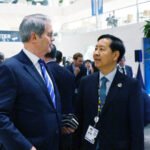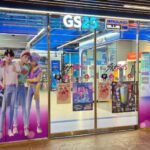(Courtesy of Getty Images)
South Korea’s individual investors took the recent turmoil in stock markets as chances to buy shares at home and abroad on dips, betting a rebound on the looming interest rate cuts.
Domestic retail investors purchased a combined net 3.8 trillion won ($2.8 billion) in Seoul stock markets and $346.2 million in overseas markets on Aug. 1-9, according to the Korea Exchange and the Korea Securities Depository on Monday. In the first seven months of the year, those investors shunned local shares, dumping a net 9.3 trillion won in total.
Individuals changed their stances by absorbing domestic blue chips and battered names such as Samsung Electronics Co. when the Kospi tumbled on fears over a potential US recession. They bought net 3.1 trillion won in the world’s top memory chipmaker, 624 billion won in its smaller rival SK Hynix Inc., 219 billion won in the cosmetics giant Amorepacific Corp., 132 billion won in the country’s No. 2 automaker Kia Corp. and 111 billion won in the online behemoth Naver Corp.
Foreign investors and domestic financial institutions sold a net 2.2 trillion won and 1.9 trillion won, respectively, in Seoul stock markets during the nine days, pushing down the benchmark Kospi by 6.6%. The index suffered the worst day on Aug. 5 since the 2008-09 global financial crisis with an 8.8% loss.
South Korean retail investors also rushed to purchase overseas stocks, especially leveraged exchange-traded funds (ETFs), which use financial derivatives and debt to amplify the returns of underlying assets. Their top picks included the Direxion Daily Semiconductor Bull 3X Shares (SOXL), which seek daily investment results, before fees and expenses, of 300%, or 300% of the inverse (or opposite), of the performance of the NYSE Semiconductor Index.
(Graphics by Dongbeom Yun)
CALM AFTER STORM
Such purchases in the market turmoil came after individual investors enjoyed profits with the buying the dips strategy when COVID-19 haunted the global markets.
The Kospi on March 19, 2020, dropped 8.4% to 1,457.64 as global financial markets were in a bloodbath with the growing fears over the pandemic. Some South Korean individual investors bugged the trend, however, by aggressively adding shares sold by foreign and institutional investors.
The index turned to the north to end 2020 with the highest close for the year of 2873.47. Retail investors bought a net 33 trillion won in total from March 19 to Dec. 30, 2020, while foreigners and domestic institutions sold a net 10.7 trillion won and 23.1 trillion won, respectively, according to the Korea Exchange.
Samsung Electronics preferred shares, Hyundai Motor Co. and Naver were individuals’ top picks during the period. Shares in the country’s top automaker surged 175.4%, while Samsung’s preferred shares and Naver jumped 72.4% and 92.7%, respectively.
INTEREST RATE CUTS
Sentiment on stock markets has recently improved as the US Federal Reserve and the Bank of Korea are predicted to slash interest rates in the coming months.
South Korean retail investors bought a net 1.1 trillion won in bonds at home and abroad on Aug. 1-9 based on the expectations.
Liquidity also increased with the cash and deposit balances of households and non-profit agencies up 61.5 trillion won to 2,472 trillion won as of the end of the first quarter from end-2023, according to BOK data.
Analysts stayed cautious over local stock markets, given the risks of a US recession and the global unwinding of the yen carry trade, as well as the intensifying geopolitical tensions in the Middle East, although the Kospi recovered some of earlier losses on demand from retail investors.
The market became more volatile with the Kospi 200 Volatility Index at 24.49 on Monday. The index was higher than 20 only on five days in July.
“The recent stock markets are unusually volatile,” said Yeom Dong Chan, a quantitative analyst at Korea Investment & Securities Co. “Investors are better to take a conservative stance ahead of the release of macroeconomic data.”
By Ik-Hwan Kim and Han-Shin Park
lovepen@hankyung.com
Jongwoo Cheon edited this article.















